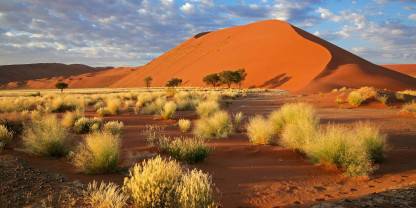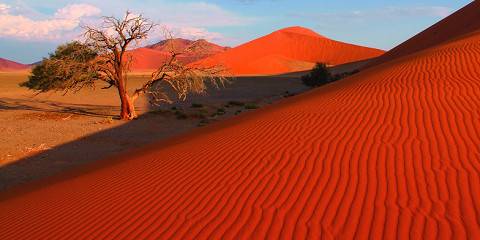Namib-Naukluft National Park is one of Africa’s largest parks, with some of the most accessible and spectacular desert scenery on the continent. It is home to the Sossusvlei area, an expanse of enormous red sand dunes that is one of Namibia’s main tourist attractions. The desert habitat doesn’t support many large animals, but spotting the occasional wildlife amid the magnificent scenery makes any visit here worthwhile.

-
Best Time To Go
- May to September (Less hot)
-
High Season
- July to November (Busy; high-season rates apply)
-
Size
- 49,768km² / 19,216mi²
-
Altitude
-
0-2,044m /0-6,706ft
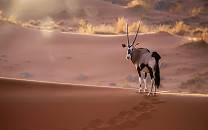 View Photos
View Photos
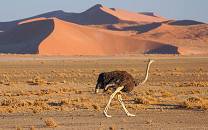 View Photos
+24
Photos
View Photos
+24
Photos
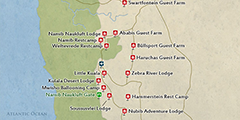 Open Map
Open Map
Pros & Cons
- Stunning desert scenery, including the red dunes at Sossusvlei
- Encounters with desert-adapted wildlife in a pristine setting
- Good walking options in the Naukluft Mountains
- Conditions can be very hot and dry
- Low animal densities and little variety
- Sossusvlei can be very crowded in the high season (July to November)
Wildlife
The park is not primarily a wildlife destination, but quite a few species are easily encountered. Seeing a herd of gemsbok walking across the sands is an unforgettable sight, while black-backed jackals stalk the area at night. The Naukluft Mountains are mainly a hiking destination, where Hartmann’s mountain zebra are sometimes spotted.
More about Namib-Naukluft’s wildlifeScenery
Namib-Naukluft has amazing desert scenery. A famous photo opportunity in the Sossusvlei area is Dune 45 (80m/262ft), which can easily be climbed. For a greater challenge, tackle Big Daddy Dune (325m/1,066ft). It overlooks Deadvlei, a white clay pan dotted with dead trees set against a backdrop of towering red dunes. The much lusher Naukluft Massif has deep gorges and crystal-clear springs.
Activities
Because there is little wildlife to see here, most guided or self-guided drives focus on the scenery. Guided walks are often the most popular activities, whether along the hiking trails of the Naukluft Mountains, or climbing the dunes of Sossusvlei. In some of the private conservancies alongside the park, quad biking is a popular pastime.
Weather & Climate
You won’t see much rain in this enormous park, even though summer (November to April) is nominally regarded as the region’s Wet season. The only significant rainfall comes in the first few months of the year. Those trekking in the mountains at that time should beware of rare flash floods. Sub-zero temperatures can occur in winter (May to October, which is known as the Dry season), but only in the park’s higher altitudes.
More about the weather and climateBest Time To Visit
If you want to go searching for wildlife in the Naukluft Mountains, and particularly if you’re tying this in with a trip to Etosha National Park, visit in the Dry season (May to October). Just be prepared for crazy crowds at Sossusvlei and the early-morning chill. The ideal conditions are during the cooler months from May to September. It can get ridiculously hot during the Wet season (November to April), though the blooming desert flowers and migratory birds can make the heat worthwhile.
More about the best time to visit
